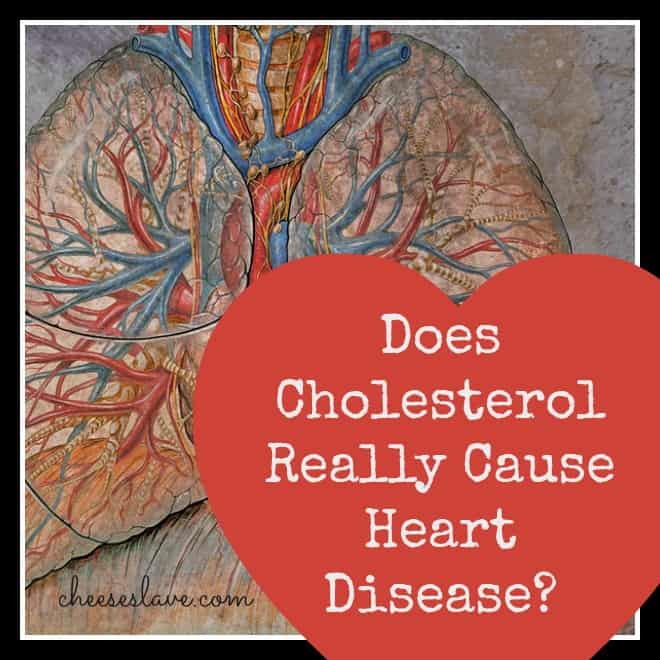Does Cholesterol Really Cause Heart Disease?
Is cholesterol bad for you? Does cholesterol cause heart disease? Most people answer yes to both questions.
Is cholesterol bad for you? Does cholesterol cause heart disease? Most people answer yes to both questions.
You might be surprised to know, however, that cholesterol is actually good for you and in fact, it’s been shown in numerous studies that cholesterol found in egg yolks or real butter (as well as in numerous other real food sources, along with saturated fats) does not cause heart disease.
In fact, cholesterol is good for you.
Am I just trying to justify eating things that are bad for me because I like eggs and bacon for breakfast and an after-dinner dessert that isn’t “low-fat”?
Not at all. Not only do I enjoy natural foods that are high in cholesterol, but I can eat them without worry because I know that these real foods are actually good for my body.

Does Cholesterol Really Cause Heart Disease?
The conventional story on why cholesterol is bad for you, the “lipid hypothesis”, suggests that there is good and bad cholesterol, and that the bad type clogs arteries, which increases the risk for heart disease. Many doctors test to see how high or low cholesterol is in order to ascertain risk. According to Uffe Ravnskov, MD, PhD on the Weston A Price Foundation website, this is not valid. Ravnskov writes:
“[T]here are now a large number of findings that contradict the lipid hypothesis. To be more specific, most studies of old people have shown that high cholesterol is not a risk factor for coronary heart disease. This was the result of my search in the Medline database for studies addressing that question.2 Eleven studies of old people came up with that result, and a further seven studies found that high cholesterol did not predict all-cause mortality either.
“Now consider that more than 90 % of all cardiovascular disease is seen in people above age 60 also and that almost all studies have found that high cholesterol is not a risk factor for women. This means that high cholesterol is only a risk factor for less than 5 % of those who die from a heart attack.
“But there is more comfort for those who have high cholesterol; six of the studies found that total mortality was inversely associated with either total or LDL-cholesterol, or both. This means that it is actually much better to have high than to have low cholesterol if you want to live to be very old.”
It’s actually the oxidization of fats in processed foods that leads to harmful LDLs and higher levels of insulin that contribute to heart disease. So it isn’t high levels of cholesterol, but what happens when LDLS are oxidized that can lead to health problems no matter how much intake of cholesterol you might have. Other factors, such as stress, lead to inflammation and heart disease as well. (Source).
Is Cholesterol Actually Beneficial?
Chris Masterjohn is the go-to expert on the benefits of cholesterol. (Visit his website: cholesterol-and-health.com).
His extensive research has led him to dismiss the myth that cholesterol causes heart disease, and instead to conclude that cholesterol is actually good for you.
Cholesterol helps to maintain and regulate cell membranes by maintaining their integrity and fluidity as well as by securing important proteins that keep our cells healthy. Cholesterol is also abundant in the brain and is vital for learning and memory. Chris Masterjohn writes:
Myelin, which covers nerve axons to help conduct the electrical impulses that make movement, sensation, thinking, learning, and remembering possible, is over one fifth cholesterol by weight.
Even though the brain only makes up 2% of the body’s weight, it contains 25% of its cholesterol.
One of the groups of genes that the above study found to be upregulated during sleep were genes important for the synthesis and maintenance of myelin, including myelin structural proteins and genes relating to the synthesis and transport of cholesterol.
But the benefits of cholesterol extend beyond both sleep and myelin. In fact, in 2001, cholesterol was found to be the most important factor in the formation of synapses, the basis of our learning and memory. (Source)
Cholesterol also plays a role in the synthesis of bile acids, which is necessary for digestion.
But just as important, cholesterol is synthesized from Vitamin D, which is extremely important, and from which many American suffer a deficiency. (See The 10 Best Sources of Vitamin D)
Cholesterol also is involved in the synthesis of important steroid hormones, such as Glucocorticoids, which assist in the regulation of blood sugar; Mineralcorticoids for mineral balance and the regulation of blood pressure, and sex hormones.
Statins are Dangerous, Not Cholesterol Managers
Statins are drugs that are often prescribed to help lower cholesterol with the presumption that cholesterol is bad for you and can lead to heart disease. Often, statins can be very dangerous, lead to diminished cognitive abilities, and create numerous health problems. Given the importance of cholesterol for kids, the trend to prescribe statins for children is alarming.
Even Dr. Oz has come out and said that statins are dangerous, and has even come a long way towards agreeing that cholesterol doesn’t cause heart disease.
These books are good starting points for further research:
- [easyazon-link asin=”1592335217″ locale=”us”]The Great Cholesterol Myth: Why Lowering Your Cholesterol Won’t Prevent Heart Disease-and the Statin-Free Plan That Will[/easyazon-link]
- [easyazon-link asin=”0967089700″ locale=”us”]The Cholesterol Myths: Exposing the Fallacy that Saturated Fat and Cholesterol Cause Heart Disease[/easyazon-link]
- [easyazon-link asin=”1844546101″ locale=”us”]The Great Cholesterol Con: The Truth About What Really Causes Heart Disease and How to Avoid It[/easyazon-link][easyazon-link asin=”0970081790″ locale=”us”]Statin Drugs Side Effects and the Misguided War on Cholesterol[/easyazon-link]
Good sources of cholesterol and aracadonic acid: Butter, liver and egg yolks
What’s Your Experience With Cholesterol?
Are you surprised to hear someone say cholesterol is not the enemy and doesn’t cause heart disease? What do you think about this important issue? Share your thoughts and experiences below.
Photo credit: Heart Outtake



Comments ()